 BUY IT AT AMAZON: CLICK HERE!
BUY IT AT AMAZON: CLICK HERE!
STUDIO: Warner Bros.
MSRP: $68.98
RATED: Various
Tennessee
Williams was one of our nation’s great playwrights around the middle of the
twentieth century. He was a practiced hand at using the naturally confining
space of the stage to create emotional crucibles, cramped locations where
cross-purposes had no choice but to lash against each other or crumble. Warner
Bros. have collected seven of their Williams adaptations in one scrap of
cardboard. They’ve also released them individually, so I guess the pitch is:
"So great, you’ve got to get them all!"

Cat on a Hot Tin
Roof (1958)
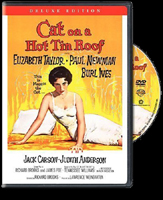 RUNNING TIME: 108 min.
RUNNING TIME: 108 min.
SPECIAL FEATURES:
• New Featurette: Cat on a Hot Tin Roof: Playing Cat and Mouse
• Commentary by Biographer Donald Spoto
• Theatrical Trailer
The Nutshell
Maggie
the Cat (Elizabeth Taylor, rowr) married into one of the most wealthy families
in the South when she snapped up former football star Brick (Paul Newman). But,
like Brick’s prowess on the gridiron, whatever love they had has faded into the
past. Brick and Maggie return to the family manse to celebrate the birthday of Brick’s
father, Big Daddy (Burl Ives), where Brick drinks himself into a clarity of
thought reserved for the true alcoholic, Big Daddy learns the truth of an
illness he has been facing, and Maggie takes her claws and sets into all the
secrets she and Brick have been holding from one another.
The Lowdown
This film
holds two lessons: an introduction to the recurring motifs of Williams’ writing,
and a testament to the cinematic power to heighten stage presence.
"Presence" is kind of an ephemeral term, a "I knows it when I
sees it" sort of thing, but I can tell you that if you don’t knows it
after watching this film, you probably ain’t gonna sees it. Newman and Taylor,
particularly, display their skills at dialogue and form an unmistakable
chemistry while the camera plays roving eye, enhancing the performances in a
way that can’t be accomplished on the stage.
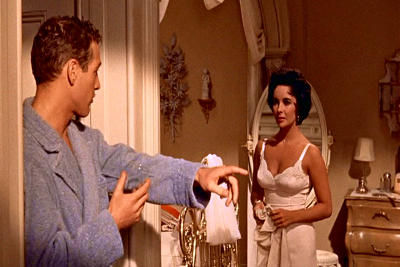
"No, no. How about over there?"
Many of
Williams’ literary obsessions surface here, and, since they’re going reoccur
all throughout the review of this set, this is a good place to bring them up.
Partly, that’s because Cat doesn’t really deal with them as
effectively as in others of Williams’ stories, so you can think of it as a sort
of survey course in downtrodden-Americana.
Line-’em-up:
you got your marital dissatisfaction, your suspicion of illicit histories, your
familial dysfunction, your dissection of femme fatales, and a bit of your
religious hypocrisy. I’ll write more about it later, but the fact that these
themes reoccur is not at all a strike against Williams’ writing; rather, that
he revisits them reminds me of a very thorough carpenter, measuring and cutting
individual boards to create a structure out of his life’s work.
Despite
Newman and Taylor’s stunning performances, the drama of Cat is less realized, the
arc of thematic progression less complete than in others of Williams’ stories.
All of his work is about broken people, but these are perhaps not the most pointed
of all his shattered lives. Nevertheless, it can be considered a classic for
good, bankable reasons, and is enthralling — if not fully rewarding — from
personal failure 1 to personal failure n.
7.6 out of 10

A Streetcar Named
Desire (1951)
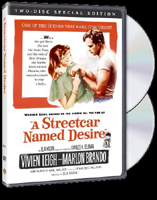 RUNNING TIME: 122 min.
RUNNING TIME: 122 min.
SPECIAL FEATURES:
• Commentary by Karl Malden, Rudy Behmler, Jeff Young
• Elia Kazan Trailer Gallery
• Outtakes
• Marlon Brando screen test
• Feature-length profile of Elia Kazan
• Five new documentary featurettes
The Nutshell
Blanche
DuBois (Vivien Leigh) arrives in the Big Easy from parts unknown, jobless and
mostly penniless, hoping to crash with her sister Stellaaaaaaa! and
brother-in-law Stanley (Marlon Brando). Taking pity on the poor dear, Stella
lets her have one of the two she and
is not forthcoming. Instead, she tries to take over, usurping Stella’s house,
clothes, bathroom, and gunning for
salt-of-the-Earth
dirt-of-the-Earth on Blanche, the revelations of which prove to unravel two
entire lives, if not more.
The Lowdown
As the
story goes, before Streetcar made its theatrical debut, it was reviewed by the
Legion of Decency. (If there’s nothing else positive you can say about society,
at least crow that the Legion of Decency is disbanded, at least officially, and
the Comics Code Authority is eatin’ grass.) That demon Legion decided that a
number of sequences in the film were too provocative, too charged with
sexuality to be unleashed on the public.
Well,
this disc rectifies those edits and presents you with the proverbial
"director’s cut," even though Elia Kazan isn’t around to make final
approval. The "perverse" scenes that have been replaced are nothing
spectacularly provocative by today’s standards, but it is nice to have the film
follow more closely the stage play.
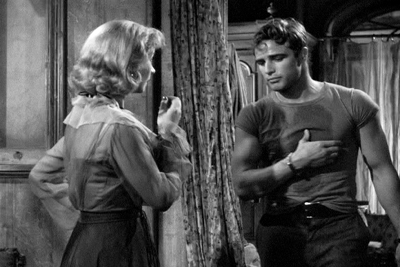
"Your story, Blanche, it gets me right here, y’know."
In a way,
the renewal of the film’s original vision parallels the overriding theme of the
story, which is about pretension being stripped away, layer by layer, with
excruciating precision, the difference being that Blanche’s pretension isn’t
created by anyone but herself.
There’s a
dreadful tension that stalks a person’s body when the exterior life doesn’t
match, and Streetcar is about three distinct methods of dealing with that
tension.
to find a balance, and Blanche tries to impress her sense of herself onto her
surroundings. None are particular successful, but the interaction between them,
dramatically speaking, certainly is.
Elia
Kazan was a perfect match for Williams’ story.
and his little touches of expressionism throughout the film make for what seems
like an effortless adaptation of an oddly-paced script.
grounded script make for the perfect mix of lofty ideals and attainable goals.
I can’t
leave without saying a bit about Marlon Brando, who absolutely knocks it out of
the park with this performance.
everyman who is at once the guy down the street and a memorable and unique
individual. Brando is sympathetic, cold, off-putting and passionate — the sort
of performance that makes you wonder how the wildly changing temperatures
didn’t crack his skin wide open.
8.9 out of 10

Baby Doll (1956)
 RUNNING TIME: 114 min.
RUNNING TIME: 114 min.
SPECIAL FEATURES:
• New Featurette: Baby Doll: See No Evil
• Theatrical trailers
The Nutshell
That’s
two stories of marital dissatisfaction, so far. How about another? For this
one, check out a middle-aged man, Archie Lee (Karl Malden), and his
barely-legal bride, Baby Doll (Caroll Baker). Archie Lee married Baby Doll,
promising to provide her with a fine house and life of luxury. Unfortunately,
the cotton crop didn’t quite cooperate, and Archie Lee finds himself without
much of a bank to balance on.
Enter
Silva Vacarro (Eli Wallach), a man from out of town who works with a large
consortium of cotton farmers. His was the only cotton crop to do well, which
makes him instantly attractive to the impetuous Baby Doll. A complex plot of
barn-burnings, legal threats, indiscretions and infidelities spins ever tighter
as Baby Doll tries to wrap it all around her finger.
The Lowdown
When
you’ve got something that works, go with it. Elia Kazan and Tennessee Williams
re-teamed for this picture, which has a very different feel from that of Streetcar.
Young Caroll Baker was cast in the titular role, and she pretty much owns the
picture. She projects an innocence and deviousness so intertwined as to make
them inseparable.
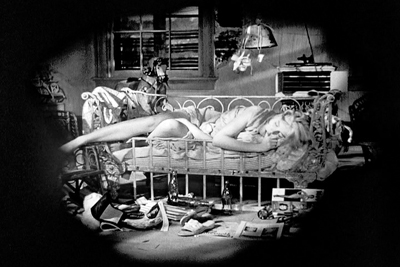
Did you know that sucking your thumb automatically negates Freudian dream theory?
It’s like Opposite Day in Psychotherapy Land.
For as
much relative power as she seems to wield over the rest of the players in the
picture, the story is really more about sinking in metaphorical quicksand than
puppet-mastery. In one way or another, each of the characters is settling for
something he or she doesn’t particularly want. As they realize they are close
to going under, each struggles, which only makes them sink faster.
The film
has a somewhat wider scope than the others in the set, so far. Where Cat
and Streecar
are focused on the stifling closeness of the family structure, Baby
Doll pulls back a bit to the stifling closeness of a small agricultural
community. With the cotton businesses in contention, and dirty dealings on the
dark side of the law, the politics come on strong. In fact, there’s a
reasonable argument here that this film is less intimate and more plot-driven,
though that could be the presence of the playwright’s oft-used tool: fate. When
fate is a presence in a story, the characters feel less as though they are
driving themselves, and more as if they are being driven by the plot.
That
being said, the plot is a good one, full of the tragedies of actions performed
without awareness of consequences or reason.
7.4 out of 10

Sweet Bird of Youth (1962)
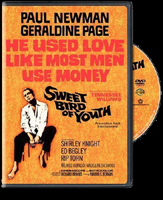 RUNNING TIME: 120 min.
RUNNING TIME: 120 min.
SPECIAL FEATURES:
• New Featurette: Sweet Bird of Youth: Chasing Time
• Geraldine Page and Rip Torn screen tests
• Theatrical Trailer
The Nutshell
Chance
Wayne (Paul Newman) has returned to his hometown, and he has brought some cargo
along, in the form of one silver screen actress Alexandra Del Lago (Geraldine
Page). He hopes to keep Alexandra hostage in her hotel room until she signs a
contract that will provide
since childhood.
Success,
however, is not his only lust. His young sweetheart, Heavenly Finley (Shirley
Knight) has been waiting for him to sweep back home and take her away from her
politico father, Boss Finley (Ed Begley). Now Chance has to juggle these two
important women in while fending off the crocodile-grins of Boss Finley and his
goons, and finally realize the dreams that he has hung his life on for so long.
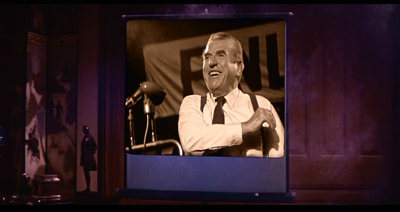
What a limp wristed seig heil.
The Lowdown
Melding
the broad and intimate considerations of all three of the preceding films, Sweet
Bird is probably my favorite out of all of them. It has the slow
personal combustion of Cat and Streetcar with the
engaging and recognizable plot of Baby Doll, plus Paul Newman, and Ed
Begley in a role that shows what a fucking monster the guy can be. On a
visceral level, it’s the most successful at kicking at the viewer’s base
emotions, then slides effortlessly into winning the more analytical parts of
the brain with its insightful dialogue and biting humor.
The
setting is something of a variation on the sleepy southern atmosphere. It still
takes place down on the
immoral politics and, in its way, by the return of hopeful bigshot Chance. The
political and sociological turmoil makes for an excellent backdrop to the theme
of hypocrisy. It’s not strictly religious hypocrisy that steers the plot,
though that does show up from time to time; instead, it’s a hypocrisy of the
humanist — the tension between selfishness and selflessness — and the tacit
question: what makes a humanist different from a solipsist?
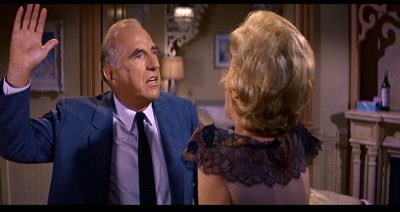
A little Fremen around the eyes?
That’s
the heady, intellectual junk that rewards close viewing, but Sweet
Bird delivers on its promises of entertaining diversion, as well. The
futility of pursuing nostalgia creates a melancholy tone for the whole effort,
and the plot element of Boss Finley’s abuse of power does what it can to rip
even the carpet of regret out from under Chance. The plot gives you excitement,
political showdowns, a couple of unexpected thrills, and a monster of a bastard
to get the ol’ heart thumping.
I don’t
want to take too long on any individual film, but I will say that as far as
providing the audience with a wealth of connections they get to draw on their
own, and a rich symbology that doesn’t overwhelm, Sweet Bird of Youth is my
choice for the most rewarding film in this set.
8.8 out of 10

The Roman Spring of
Mrs Stone (1961)
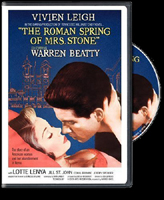 RUNNING TIME: 104 min.
RUNNING TIME: 104 min.
SPECIAL FEATURES:
• New Featurette: Mrs Stone: Looking for Love in All the Dark Corners
• Theatrical trailer
The Nutshell
Tennessee
Williams tries his hand at a Austen-esque romantic comedy. Of course, he adds
his own touches, removing the "comedy" bit and emphasizing the social
machinations that lead toward marriage over the "romance".
Vivien
Leigh plays Mrs. Stone, a recently widowed stage actress who finds herself
alone, in
target of every scheming old biddy with a nephew, son, or street acquaintance
to marry off.
The Lowdown
This is
something of a different animal for Williams’. It was based on a novella,
rather than a play, which ends up having two consequences: 1) There’s a
voice-over, and 2) The pacing isn’t very efficient. An adaptation of prose
generally requires more culling of extraneous details, but it seems that much
of the original story is intact, which means Mrs Stone feels more
languorous than it ought, and less immediately engaging than the others in the
set.
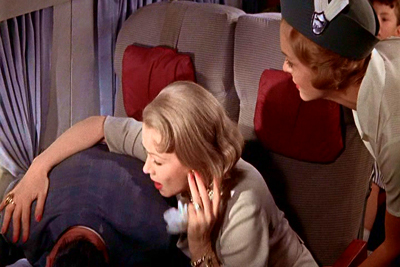
"Okay, honey, you got my shoes with that one."
Another
thing to the film’s detriment is that, in prose, much of the character building
is done in the narration, whereas in stage it necessarily resides in the
dialogue. The characters in this adaptation are not as well-drawn as, say,
Stanley Kowalski, and I think that can be attributed, in part, to the
adaptation process.
Vivien
Leigh and Warren Beatty do a fine job with a romance built on underestimations.
Neither is quite aware of the other’s boundaries, and the most interesting
portion of the film is based around the each’s delicate testing of the other.
On the
whole, it’s not up to the quality of the other film adaptations in the set. It
drags significantly during the second half and is littered with artifacts of
prose adaptation, not to mention the question of the necessity of writing a
Victorian romance in a modern setting.
7 out of 10

The Night of the
Iguana (1964)
 RUNNING TIME: 117 min.
RUNNING TIME: 117 min.
SPECIAL FEATURES:
• New Featurette: Night of the Iguana: Huston’s Gamble
• Vintage Featurette: On the Trail of the Iguana
• Theatrical trailers
The Nutshell
Let’s finish
off the narrative discs with a bang. Here’s a collection of talent that would
be hard-pressed to create a dud. Richard Burton on lead, John Huston behind the
lens, and Tennessee Williams on keyboards. Plus some old guy reciting verse.
Iguana is the story of ex-minister T.
Lawrence Shannon played by
voice of God) slumming it up in
bussing old ladies around on penny-weight tours of the countryside. On his
latest tour, a lady of somewhat fresher years joins the tour. She’s so fresh,
in fact, that she’s illegal, which several of the busybodies don’t mind
reminding their guide of.
When
things get tense on the tour, and the ladies threaten to have him fired,
stranding the whole company at an off-season hotel. There, in the sweltering
heat and unfamiliar surroundings,
the harpies he’s stuck with.

"I don’t think I was sexy enough, Mr. Huston. Let’s do another take."
The Lowdown
Just
going from the plot description, Iguana could easily be considered a
comedy. It’s got a wacky set-up, and characters that start out as simple
archetypes in service to a plot.
Huston
and Williams both know what to do with archetypes, as demonstrated in their
respective life’s works, and it doesn’t take long for the equatorial magic to
take effect.
believable than Mel Gibson’s in Signs, and much more interesting as
a result. Religious purgatory doesn’t engage audiences well unless there is a
sympathy for the character behind it; the cold facts of the death of faith are
boring, but when you care about the character then you’re much more willing to
face the abandonment of security. You can see it as a journey rather than a
plot hook.
Huston’s
eye for framing, shadows, and beautiful use of black-and-white is as strong as
ever in this picture. It’s also not hard to see why Huston was drawn to this
story, since it’s really about a maverick on a quest, much like many of his
famous Westerns.
A fine
performance from
the schadenfreude out of potentially comedic
situations makes The Night of the Iguana a low-tone success. It’s a case of a
number of steady bakers contributing to quite a feast of a cake.
8.6 out of 10

RUNNING TIME: 80 min.
SPECIAL FEATURES: None
Like his
contemporary William Faulkner, Tennessee Williams was preoccupied with the
South, its inhabitants, and the ways in which its history has led into its
present. South is sort of a documentary on Williams’ observations, memories,
and meditations on the lands of
musings on a world with borders — a world in which Williams spent a lot of his
time. The film mostly provides a chance for Williams’ to exercise his non-fictive
muscles in identifying explicitly the themes he returns to, obliquely, in his
literature. As a capstone to this thoughtful collection, it’s a welcome
addition, and more of a bonus feature than a film in its own right.

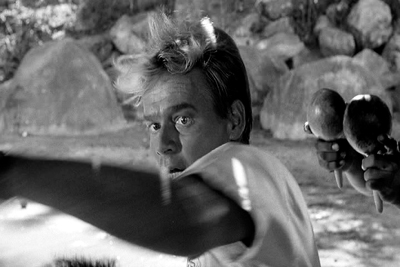
Don’t drink the water, and don’t piss off the maracas.
The Packages
Without exception,
these are decent discs in the way of bonuses, with the additional gift of an
exceptional two-disc set for A Streetcar Named Desire. I won’t
discuss everything, but know that you’re not getting ripped off with completely
bare-bones discs. In all cases, you get at least one new featurette, which range in quality from insightful to fluff.
Streetcar‘s two discs contain commentary,
featurettes, and screen tests a-plenty, encapsulating a brief history of a cinematic legend, and quite a few attending minutiae.
The Super Lowdown
This set
is somewhat unusual in that it focuses on a writer rather than a director.
Writers don’t usually rate their own seven disc collections, but Williams’
contributions to the literary world fully justify this set’s existence. He was
a man who created a very definite picture of the world. His vision of the South
and its inhabitants is one worth revisiting for its even-handed character
design, bitter ironies, and covert insights into a few human conditions.
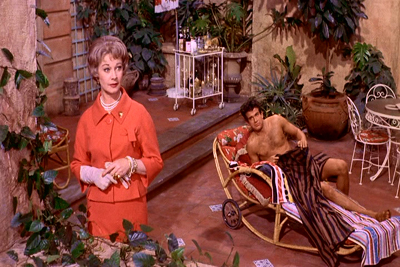
"Are you… enjoying the view?"
These
stories are amazing; the films a bit more hit-or-miss, but that’s kind of like
saying that the loser of a beauty pageant is a more ugly person than the
winner. You can even cherry-pick these discs if you’re not a completist, and
there’s at least a couple that everyone should see at some point in their
lives.
Overall: 8.7 out of 10